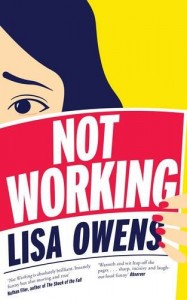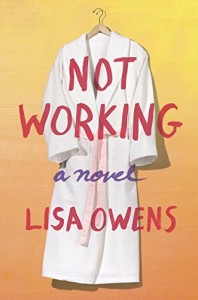 Published by Picador UK/ Dial Press US
Published by Picador UK/ Dial Press US
21 April 2016/3 May 2016
Reviewed by Zoë Fairbairns
Clare Flannery, narrator of Not Working, has been likened to Bridget Jones. I can’t think why. Bridget worked for a living. And she knew what she wanted: the love of a good man. Clare, by contrast, is unemployed by choice – ‘I don’t want to rush into anything, end up somewhere I don’t want to be’ – and has a kind, sexy, brain-surgeon boyfriend called Luke who supports her financially and puts up with her annoying ways. How long she will hang on to him if she doesn’t stop spying on his Facebook page, neglecting her fair share of the housework, and insisting on chatting to him on the phone when he is all scrubbed-up and preparing to drill into someone’s skull, is one of the questions that keeps the pages turning.
Meanwhile there’s a purple buddleia sprouting from a plaster pillar of the building where Claire and Luke live. This menacing weed has a certain beauty but, experts warn, it’s a threat to the structure of the building: a metaphor, perhaps, for Claire’s fears about the jobs she considers (police officer? carer? teacher?) but can never quite get her hands on, let alone bring herself to apply for (‘applications are so time-consuming’). The job  may look good but will it cut away at her foundations?
may look good but will it cut away at her foundations?
For most people, unemployment means not having enough money. And if that were Claire’s situation, it might seem admirable that she was prepared to endure financial hardship as she holds out for a job that will give meaning to her days. But Claire’s life of chosen idleness doesn’t seem to have any serious financial drawbacks for her: she already part-owns the freehold on her flat, Luke picks up the bills, her grandmother gives her the family silver, and if push comes to shove Claire seems to have no difficulty picking up well-paid freelance work. Her plight is less financial, more existential. As such, it might seem a bit of a luxury, like worrying about your investments.
Much of Not Working is written in short paragraphs with subject lines, like a series of highly readable emails. Lisa Owens is often witty and observant, particularly when writing about Claire’s relationship with her grandmother: the more Claire tries to do what she sees as her duty to be kind and helpful to the poor old thing, the more this particular old thing makes it clear that she is too busy living a full and active life to be patronized.
More troubling is a storyline threading through the book about an episode from Claire’s childhood involving possible sexual abuse by her now-dead grandfather. Claire mentioned this at the grandfather’s funeral, and as a result her mother now either refuses to speak to her or directs her to web pages about False Memory Syndrome.
SPOILER ALERT. The book ends with Luke getting a job in the USA and Claire resolving to ‘temp for a bit to save up for a proper trip somewhere’. You see that, all you unemployed people out there? That’s what you do.
